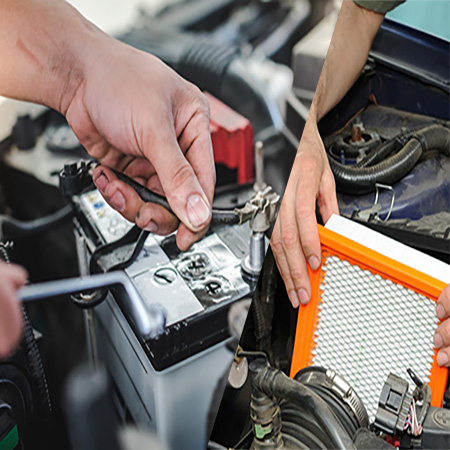How to Improve the Lifespan of Your Car
Keeping your car running smoothly and reliably for years to come isn’t just about saving money, it’s about creating memories and enjoying the freedom of the open road. Here at RAC, we understand the special bond between car and driver, that’s why we’ve compiled this list of simple yet effective tips to keep your vehicle happy and healthy well into its golden years.
Taking Care Under the Bonnet
 ● Battery Maintenance: A healthy battery is the heart of your car’s electrical system. If you don’t drive your car regularly, consider using a trickle charger to keep the battery topped up. To avoid jump starts, which can strain your car’s delicate electronics, try to take your car for a spin at least once a week, especially during winter.
● Battery Maintenance: A healthy battery is the heart of your car’s electrical system. If you don’t drive your car regularly, consider using a trickle charger to keep the battery topped up. To avoid jump starts, which can strain your car’s delicate electronics, try to take your car for a spin at least once a week, especially during winter.
● Filter Care: Engine oil and air filters play a vital role in keeping your engine clean and running efficiently. Replace them regularly as part of your car’s service schedule. Feeling handy? You can tackle the air filter yourself for a quick and cost-effective solution. Refer to your car’s handbook for specific advice and always use genuine parts to avoid long-term damage.
● Driving with Care: Develop a smooth driving style that anticipates road conditions and minimises harsh braking and acceleration. This not only improves fuel economy but also reduces wear and tear on your car’s components.
● Rev it Up (Occasionally): While driving smoothly is important, occasionally allowing your engine to rev freely helps prevent carbon deposits from building up. Once your engine oil is warm and you’re on a quiet road, a quick burst can do the trick. This is especially important for diesel cars with DPFs (diesel particulate filters). A monthly motorway run can help keep these filters clear.
● Use the Aircon: Just like any other system, air conditioning benefits from regular use. Don’t be afraid to let the cool air flow occasionally, even in winter, to prevent refrigerant gas leaks and the need for expensive re-gassing.
● Fluids Are Crucial: Regularly checking your engine oil, coolant, and screen wash is crucial. Consult your car’s handbook to locate the dipstick and reservoir for each fluid. When topping up, use the recommended type of coolant (a 50/50 mix of antifreeze and water) and avoid washing-up liquid for screen wash, as it can damage the paintwork.
● Spark Plug Change: While modern cars might require a trip to the garage for spark plug replacement, it’s a relatively straightforward job for some. Always consult your handbook before attempting any maintenance and ensure you use the correct spark plugs. Look for a light brown electrode and insulator, free of wear or deposits. If a spark plug appears worn or damaged, it could indicate a larger engine issue. Seek professional help if you’re unsure.
Keeping Your Car Looking and Feeling Its Best
● Tyre Care: Your tyres are the only point of contact between your car and the road, so keeping them in top shape is vital for safety and performance. Check the tyre pressure and tread depth weekly, referring to your car’s handbook for recommended pressures. Regularly rotating your tyres can also help even out wear and extend their lifespan.
● Service Schedule: Regular servicing is essential for maintaining your car’s health. Consult your handbook to determine the service intervals, typically based on time or mileage. Minor services often involve oil changes and filter replacements, while major services might include spark plugs and cambelt changes.
● Park it Under Cover: Keeping your car in a garage protects it from the elements, reducing the risk of rust, sun damage, and accidental bumps. If a garage isn’t an option, consider investing in a high-quality car cover for long periods of parked time.
● Lighten the Load: The extra weight of unnecessary items in your car can decrease fuel efficiency and put strain on the tyres, brakes, and suspension. Declutter your car regularly, keeping only essential items like the jack and toolkit.
● Rustproofing Matters: Modern cars are more resistant to rust, but for older vehicles, early intervention is key. Address any rust spots with touch-up paint before they worsen. Consider professional rustproofing to prevent water ingress and extend the life of your car.
Modifications and Smart Driving
● Resist Modifications: While car modifications can be tempting, they can also negatively impact your car’s reliability and lifespan. Engine tuning and stiffer suspension put extra strain on various components, potentially reducing their lifespan and resale value.
 ● Be Pothole Wise: Avoid potholes and rough roads whenever possible. These road hazards can damage your suspension, tyres, and exhaust. Report any potholes you encounter to the relevant authorities.
● Be Pothole Wise: Avoid potholes and rough roads whenever possible. These road hazards can damage your suspension, tyres, and exhaust. Report any potholes you encounter to the relevant authorities.
● Brake Wisely: Engine braking, or downshifting to slow down, can damage your clutch and transmission. Use your brakes progressively to slow down and come to a complete stop. This will help to extend the lifespan of your gears and drivetrain.
● Cleanliness is Key: Regular car washes go beyond aesthetics; they protect your car’s paintwork from harmful elements. Grit, bird droppings, and road salt can cause corrosion. Avoid automated car washes with harsh brushes that can scratch the paint. Opt for hand washing with a proper car cleaning solution and a soft chamois for drying. Don’t forget the interior! Regular vacuuming and wiping down surfaces with a microfibre cloth helps keep your car fresh and prevents cracking or discolouration.
● Foot Off the Clutch: Resting your foot on the clutch pedal applies unnecessary pressure and can lead to premature wear. Develop the habit of keeping your left foot elsewhere in the footwell when you’re not actively changing gears.
● Don’t Run on Empty: Keeping your fuel tank at least half full can prevent your fuel pump from sucking in air and debris from the bottom of the tank. This can clog the system and damage the pump and filters. For diesel cars, maintaining a higher fuel level is even more important to avoid air entering the system and preventing the engine from turning over.
● Quality Counts: When replacing parts, resist the urge to go for cheap, generic options. Original equipment manufacturer (OEM) parts are designed and rigorously tested to work seamlessly with your car. This can save you money in the long run by avoiding compatibility issues and potential damage. The same applies to fluids – use the engine oil recommended by your car’s manufacturer.
● Heed the Warnings: Ignoring warning lights on your dashboard is a recipe for disaster. These lights indicate potential issues that, if left unchecked, can lead to expensive repairs or even safety hazards. Don’t hesitate to consult an RAC-approved garage to diagnose and address any warning light issues promptly.
● Routine is Vital: Simple DIY checks every two weeks can catch problems early and prevent them from snowballing into major issues. Here’s a quick checklist:
○ Engine oil level and colour
○ Tyre pressure and tread depth
○ Coolant level
○ Screen wash level
○ Windscreen wiper condition
○ Lights and indicators
○ Battery condition (look for signs of corrosion)
○ General wear and tear (interior and exterior)
By following these simple tips and maintaining a regular service routine, you can ensure your car enjoys a long and healthy life, creating many happy miles on the road for years to come. Remember, a little care and attention go a long way in keeping your cherished car running smoothly and reliably.

 100% Road Legal
100% Road Legal Express Delivery
Express Delivery